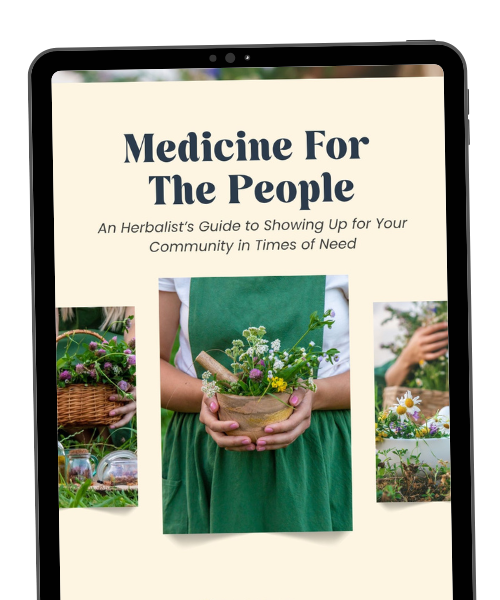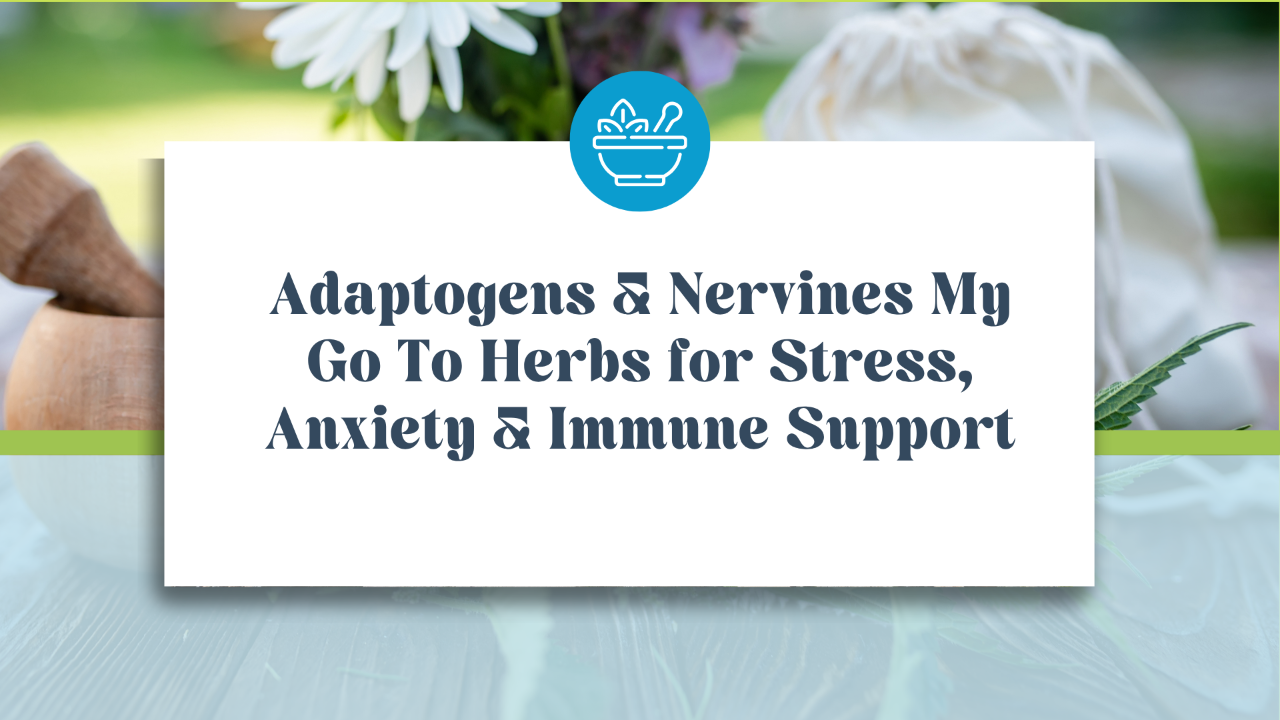How Stress Can Lower Your Immune System

It’s no big secret that chronic stress weakens the immune system. And, as we head into cold and flu season, coming to the end of a year that’s been immensely stressful for the entire world, and also heading into the most stressful, errr uhhh, “wonderful time of the year!", I figured it’s high time to talk about how these two are so related.
One of the women who help around our shop, Kalee - she’s brilliant, healthy, active, way into taking care of herself and does a killer job of getting our teas made here. Well, she’s in her senior year of college, getting her degree in psychology and going through her midterms with a heavy course load in an effort to finish her degree by June. She came into work yesterday and you could instantly see on her face that she wasn’t well. She had been talking about how this big course load is super stressful, and then she came in still stressed and said she just isn’t feeling good like she could feel herself getting sick.
And, all I could think about was the direct correlation between stress and the immune system, and how it’s such a tough time of year, and a tough year to navigate that. It’s no surprise and the research shows it.
From 1982 through 1992, a psychologist and immunologist from Ohio State University College of Medicine did some research studying medical students. They found that the students' immunity went down every year under the simple stress of the three-day exam period. Test takers had fewer natural killer cells, which fight tumors and viral infections. They almost stopped producing immunity-boosting gamma interferon and infection-fighting T-cells had very weak responses.
All of this research opened up the floodgates to a new type of study called psychoneuroimmunology (psyche dealing with emotions) neurological (dealing with the brain and the nerves) and immunology studying the immune system, and scientists are realizing the important role that our brain has on the manifestation and the treatment of disease.
In 2004, Suzanne Segerstrom, PhD, of the University of Kentucky, and Gregory Miller, PhD, of the University of British Columbia did over 300 studies on stress and health. They discovered that stress of any significant duration - from a few days to a few months or years, as happens in real life - all aspects of immunity went downhill. Thus long-term or chronic stress, through too much wear and tear, can ravage the immune system.
The meta-analysis also revealed that people who are older or already sick are more prone to stress-related immune changes. They also showed that mild depression may suppress an older person's immune system. Those with chronic mild depression had weaker lymphocyte-T cell responses which are imperative in our immune system's ability to fight viruses and bacteria.
And, as we all know, loneliness can absolutely cause depression, which causes a weakened immune system. And, during a pandemic on lockdown, not being able to see or hug the people you love, the people that make you laugh, is hard! That is really really hard!
Anyway, I’m not here to make you cry. I’m here to discuss ways in which we can take better care of ourselves, and take better care of each other. And while yes, this is a podcast about herbs, I want to talk about lifestyle choices as well because herbs don’t work so well, if you’re not willing to make the lifestyle shifts. At the least, they’ve got a much harder job, and the basic shifts I'm going to share can be easy for many.
For me, my number one stress killer is a simple walk in nature. And, while yes, I’m fortunate to live on a beautiful river in the foothills of Mount Hood, you can get out into nature even if you’re in a tiny apartment in the middle of a city.
I’ve also really been enjoying the benefits of meditation. Whether you can squeeze in 5 minutes, or 30 minutes a day. I’ve noticed a dramatic increase in my overall well-being just from creating this simple practice of meditation.
Breathing. Take the time to take a few deep breaths throughout your day. I know it sounds so stinking easy, but it’s also so stinking impactful.
Yoga and the practice of breathing as you move your body is a great way to manage stress.
Taking time for yourself, yes you! Moms… Dads...
Reach out to your friends and family. Even though we may not be able to touch them and see them physically, having that conversation can be a literal lifesaver for you. And we’re fortunate during these hard times that we can actually do that and see them via FaceTime or whatever app you choose. I know it isn’t the same but…
And, of course, since I am all about herbs, let's chat about some of the herbs that help me to manage my stress, and also happen to have properties to help the immune system function well. Bonus!
Adaptogens are a fantastic category of herbs that help our bodies to “adapt” to various types of stressors whether they be physical, emotional, or environmental. They also help to regulate and support our neuroendocrine and immune systems, which we now know are interconnected.
They enhance our overall health and well-being in many ways, like working to protect our energy resources from becoming depleted. They work at the cellular level to help us cope with the effects of chronic and acute stress. And, they can even help to increase the production of specific immune cells including your helper T-cells, B cells, and NK Cells. Most adaptogens also have either immune amphoteric, meaning it helps to nourish and strengthen the immune system, or immune stimulant properties that help to boost the immune system. They’re really fantastic plant friends to have around!
Some of my favorite Adaptogens:

Licorice ~ Glycyrrhiza glabra
Another favorite herb of mine for its super sweet taste, but of course also for its myriad of medicinal benefits. It’s also an immune amphoteric, or normalizer, that has been used for immune suppression and allergies particularly to animal dander and asthmatic allergies. It’s wonderful when it comes to respiratory ailments as well, particularly when you’ve got a dry scratchy throat. And it also does a great job of fighting off various viruses including. It’s best when used in a formulation of other herbs as it’s what's called a harmonizer, meaning it brings the other herbs together to make them work in one happy little family.
Holy Basil (Tulsi) ~ Ocimum tenuiflorum
I love it because it’s delicious! It just feels so good going down. It’s sacred for the Hindu people and is drunk in the morning prayers to ensure personal health, spiritual purity and family well-being. It’s known to nourish a person's growth to perfect health and promotes long life.
- It’s a more mild adaptogenic that also acts as an antioxidant, antiviral, and an antibacterial herb.
- It’s been shown to improve overall memory and reduce mental fog.
- Studies have shown to help reduce asthmatic symptoms and even reduction in blood sugar for type 2 diabetics
- All of those benefits and so much more, yet it’s just incredibly delicious!
Ashwagandha ~ Withania somnifera
My stress go-to! I typically use it to help handle my stress load as a business-owning mama, and all of the other life stuff thrown my way. It can help to prolong life, it’s been used as an aphrodisiac, and even used in Ayurvedic medicine with ghee and honey for low sperm count and sexual debility in men. It's also used for low libido in women. It’s helpful in relieving anxiety, stress-induced insomnia, brain fog, and overall fatigue. It’s also rich in iron, and can be used in cases of iron deficiency. It’s also known to help strengthen and nourish the immune system.
Do You Have The Right Remedies On Hand?
Whether it’s a tummy ache, sleepless nights, or boosting immunity, The Ultimate Guide to Stocking Your Natural Medicine Cabinet has the top-quality remedies you need. Tested by a clinical herbalist—and her kid too!
Grab your guide below👇🏼
We hate SPAM. We will never sell your information, for any reason.







